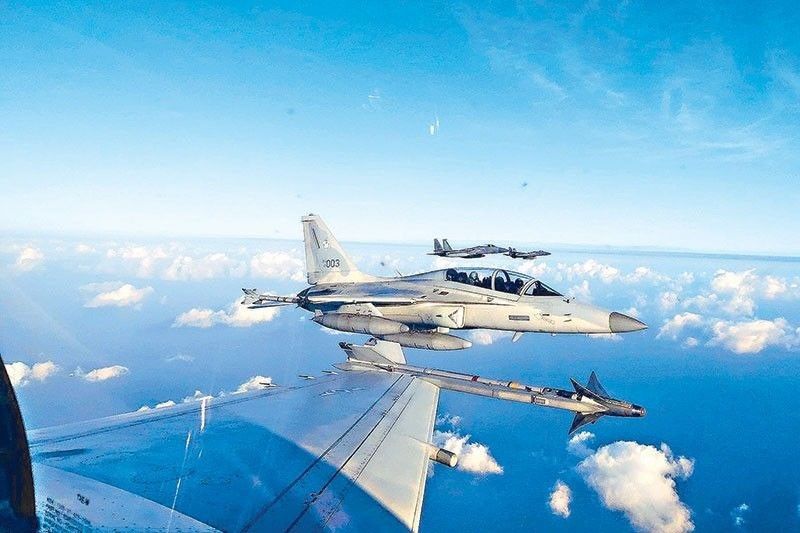Navy to increase sea, air patrols in West Philippine Sea

MANILA, Philippines — As the Philippine Coast Guard takes stock of last Monday’s run-in with the Chinese around Escoda (Sabina) Shoal that left two PCG vessels damaged, the Philippine Navy has increased its patrols in the West Philippine Sea and vowed no letup in supply missions to isolated outposts.
“Rest assured that we have increased our presence through sea patrols and air surveillance flights all over the vast expanse of our nine features in the WPS,” Rear Admiral Roy Vincent Trinidad, Navy spokesman for the West Philippine Sea, said at a press briefing yesterday.
Before dawn on Monday, Chinese coast guard (CCG) ships rammed the BRP Bagacay and the BRP Cape Engaño within minutes of each other after engaging them in dangerous manuevers in the vicinity of Escoda Shoal, which is within the Philippines’ exclusive economic zone.
Trinidad said the Philippine Navy also conducts regular rotation and resupply (RORE) missions to Patag and Lawak islands and other areas in coordination with the PCG, under the Western Command of the Armed Forces of the Philippines (AFP) and the Naval Forces West.
He said that while Escoda Shoal “is not a new flashpoint,” the presence of the CCG, the People’s Liberation Army Navy (PLAN) and maritime militia vessels (MMVs) in the area is illegal and their “actions are coercive and aggressive, their messages are deceptive.”
He also said the Philippine Navy “has a deployment plan that is now focusing on the EEZ based on the CADC (Comprehensive Archipelagic Defense Concept) of the Department of National Defense.”
“Meaning to say, we are now more capable, we are now focusing the deployment of our capital ships to cover the vast expanse of the EEZ,” he pointed out. “We should focus on the bigger picture of the vast expanse of the South China Sea, a portion of which is the WPS. Again, the presence of the agents of aggression of the Chinese Communist Party is causing all of the dynamics, all of the aggressive maneuvers in the WPS,” Trinidad said when asked if tensions have shifted from Ayungin Shoal to Escoda Shoal.
“This may shift from Ayungin Shoal to the eight other features to Bajo de Masinloc,” he said, referring to the Panatag Shoal by its local name.
“If you noticed after the BCM (Bilateral Consultative Mechanisom) and the successful RORE in Ayungin Shoal, we had the Bajo de Masinloc incident, we have the Escoda Shoal incident. Again, it is this presence (of Chinese vessels) that is causing all the dynamics in the WPS,” he added.
Threshold
He admitted that China’s actions were still outside the conflict threshold, and expressed hope they would not escalate to full-blown hostilities.
“This is part of the challenges that the Philippine Navy, the AFP and coast guard and the BFAR (Bureau of Fisheries and Aquatic Resources) face in the WPS. Nevertheless, these challenges only serve to fuel the fire within the heart of every member of the AFP to continue ensuring the integrity of the national territory,” he said.
“We will not let down or back down from performing our mandate of showing the flag, of resupplying the troops, of rotating the men,” he stressed.
Trinidad, meanwhile, confirmed a further increase in the number of Chinese vessels in the WPS in the last seven days, based on latest monitoring.
The Philippine Navy said 129 Chinese vessels were spotted in Philippine waters from Aug. 13 to 19, from only 92 reported during the period covering Aug. 6 to 12.
The latest figure comprises 13 PLAN warships, two of which were sighted in Escoda Shoal. Five of the 18 CCG vessels were also in Escoda Shoal, while spread across the WPS were 98 MMVs.
“We constantly monitor their presence. The 129 total is still within the range, acceptable range that we have been monitoring for the past two to three months,” Trinidad said.
In an interview over TeleRadyo Serbisyo, PCG Commodore Jay Tarriela said he is still hoping that Beijing would see the light and discuss the situation in the WPS with Manila.
“We are once again hoping and praying that China will eventually realize that the bullying – unlawful acts that they are doing, of course with the pressure from the international community, would again compel China to join us in the negotiating table so there will be a proper dialogue,” Tarriela said.
In a text message to The STAR, PCG Commandant Admiral Ronnie Gil Gavan said that while the Bagacay and Cape Engaño suffered some structural damage, “their respective critical systems have remained operational and no PCG personnel were injured.” — Helen Flores, Pia Lee-Brago, Evelyn Macairan, Alexis Romero, Janvic Romero, Jose Rodel Clapano
- Latest
- Trending



























